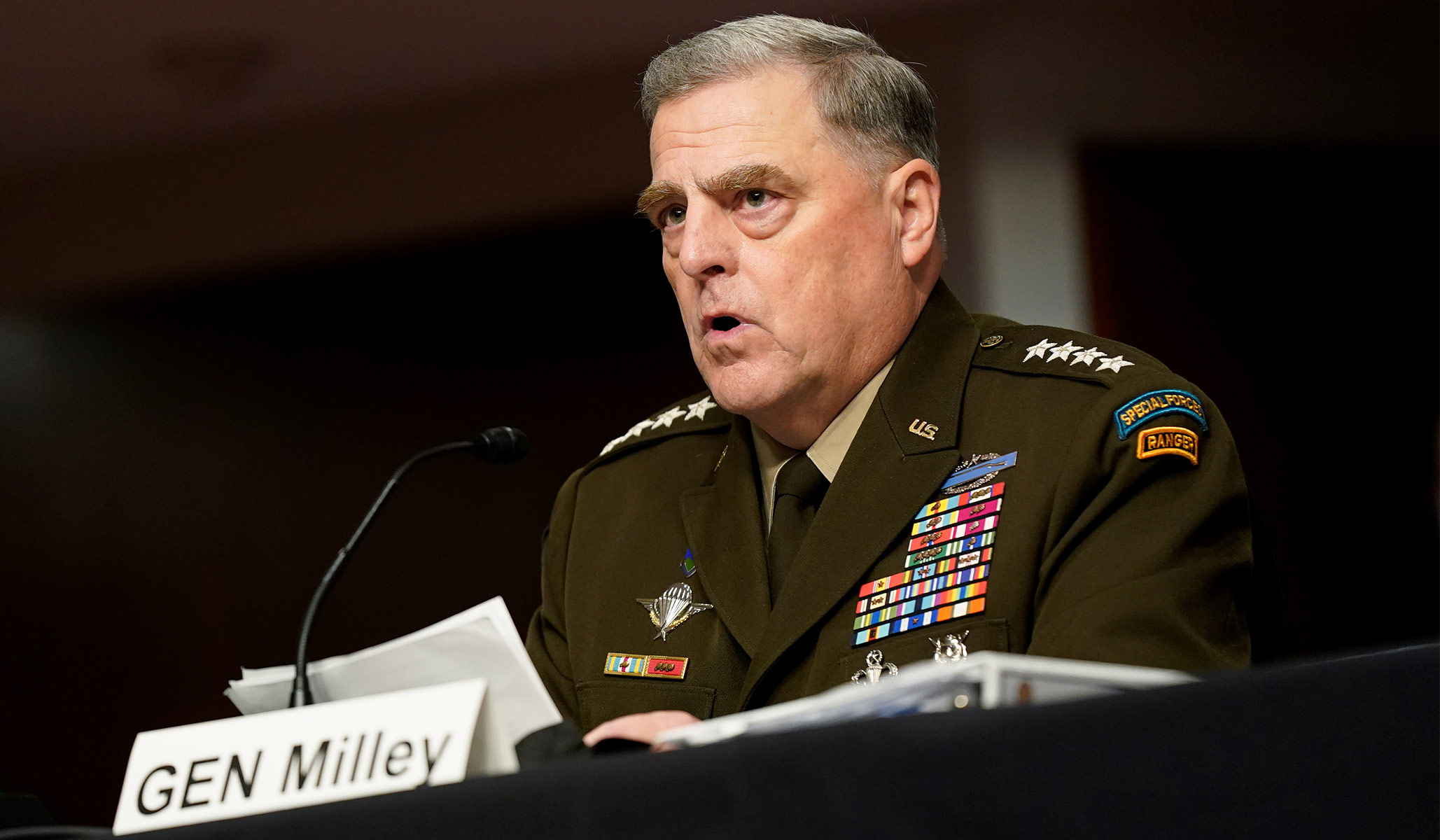


Last month, General Mark Milley, the chairman of the Joint Chiefs of Staff, set off speculation that the Biden administration had shifted the goalposts on the long-standing U.S. policy to prevent Iran from obtaining a nuclear weapon. The administration, in statements since then, has walked back the remarks. But there are still unanswered questions, which are all the more important in light of reports that the U.S. is reviving its nuclear diplomacy with Iran.
During an appearance before the House Appropriations Committee’s panel on defense, Milley addressed reports that Iran’s enrichment capabilities had moved it closer to producing a nuclear weapon. He revealed that Tehran could enrich the material necessary for one within two weeks and produce “an actual nuclear weapon” several months later.
“But the United States remains committed, as a matter of policy, that Iran will not have a fielded nuclear weapon,” he added.
That statement, and his subsequent comment that the U.S. military has several options with which to respond in such a situation, may sound like the long-held U.S. policy, but one word hinted at a monumental change.
“‘Fielded’ means they can have enough enriched uranium for a bomb,” Gabriel Scheinmann, the executive director of the Alexander Hamilton Society foreign-policy network, told National Review. He added that it could even mean that Iran would produce a nuclear weapon, and that the U.S. would act only if Iran were to deploy it.
Thus, the fielded comment did not go unnoticed in Beltway foreign-policy circles, after the Washington Times first reported on Milley’s remarks during that hearing. Andrea Stricker, a research fellow at the Foundation for Defense of Democracies (FDD), warned in a commentary on the think tank’s website that the potential “U.S. policy shift would be dangerous because the regime in Tehran may see it as a green light to move toward nuclear weapons production.”
The following week, on March 28, Milley offered similar testimony to the Senate Armed Service Committee, this time conspicuously omitting the word “fielded,” making a statement more in line with the existing policy.
So what happened between March 23 and 28?
National Review reached out to Milley’s office, the White House National Security Council, and the State Department for an explanation of the comment. The administration denied that the policy had changed.
The general’s communications adviser, Colonel Dave Butler said: “General Milley was not indicating any policy change when he used the word ‘fielded’ referring to Iran’s nuclear program.” (Milley’s office did not offer further explanation of why he used that word, and with what definition in mind, on the record.) And a State Department spokesperson said: “President Biden is absolutely committed to ensuring Iran never obtains a nuclear weapon.”
Another explanation came from Axios’s Barak Ravid, who shed light on the “fielded” comment and its abandonment five days later in a report this week: “Senior officials in the Israeli Prime Minister’s Office, Ministry of Defense, IDF, Foreign Ministry and Mossad who deal with the Iranian issue were alarmed by Milley’s remarks,” Ravid reported, citing several Israeli officials. They were concerned that the U.S. was signaling that it would allow Iran to develop a weapon as long as it did not deploy it.
According to the report, Israeli officials reached out to the Biden administration asking for a clarification; then, Milley omitted the word “fielded” from his March 28 testimony, satisfying their concerns.
Still, even if Axios has brought to light one reason for the obvious shift in language, it’s not clear why he used the word in the first place. One potential explanation is that it could have been an off-the-cuff deviation from the point that the chairman was trying to convey. Another is that it was a carefully released trial balloon for a forthcoming policy shift.
There’s ample reason to believe that the “fielded” formulation was not a gaffe. For one, Milley used the phrase during a trip to Israel last year. In a video from Israel’s TV7 station, Milley says that “it’s been the consistent policy of the United States that Iran will not have a fielded nuclear weapon, and that remains our policy.” Butler confirmed the video’s authenticity and declined to comment on its significance.
And Milley didn’t just use the word in his comments to the committee; he also used it in written testimony that he submitted for the hearing. If the general made a mistake, it’s not that he misspoke. It’s that he prepared to brief Congress using an inaccurate talking point.
“One hopes the recent ‘fielded’ comment was not a genuine trial balloon but a slip-up. However, given that the comment had to be clarified, it appears to have been intentional,” FDD senior fellow Behnam Ben Taleblu told National Review.
The broader context might be instructive, considering that proponents of a more accommodating posture toward Iran seem to have introduced subtle changes of U.S. policy in other ways. In one shift, U.S. officials have seem to have moved away from saying that reentering a nuclear deal with Iran would have “nonproliferation benefits,” in recent months more using the justification that an agreement is in U.S. interests more broadly. And now, the administration is reportedly seeking a less ambitious version of the agreement that it sought with Iran prior to last fall’s mass demonstrations.
There’s a shift there too, from U.S. officials’ repeated vows that nuclear diplomacy with Iran is “not a focus” right now to this new drive to cement a deal now that Tehran has brutally countered the demonstrations.
“Expect more, not less, of this sort of thing in the future, especially as Iran’s nuclear march blurs the space between technical and political redlines,” Taleblu said.
